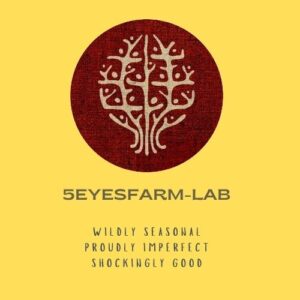
The Good Food Cycle
The good food cycle begins with awareness: knowing where our food comes from, how it’s produced, and what’s really in it. Take eggs, for example. There’s a world of difference between those laid by battery hens and those from truly free-range chickens. But once they’re scrambled, baked into a cake, or blended into a meal, that difference becomes harder to detect. Free-range eggs usually come from birds fed clean, additive-free diets, without hormones or synthetic inputs—making their eggs far healthier.
And that’s just one example. The same principle applies across the board, especially in today’s fast-paced world where processed and ultra-processed foods dominate. When we choose with care, we feed not just our bodies, but a better food system.

where does our food come from?
The supermarket fuels our consumer culture, making it easy to forget – or ignore – where our food comes from, or even what it really is. Read the label? Too small. No time. Even so-called “high-end” chocolate is cutting corners, replacing natural cacao butter with palm oil. Why? Cost. Price. Profit. But what about what we’re putting into our bodies? Didn’t they say we are what we eat?


Farm to Table... Without the Middleman Named 'Factory'
The good food cycle begins with awareness: knowing where our food comes from, how it’s grown, and what’s really in it. Natural farming and permaculture design take this a step further—working with nature, not against it. These approaches build healthy soil, conserve water, avoid harmful chemicals, and support biodiversity. The result? Food that is truly organic, GMO-free, hormone-free, and deeply nourishing.
Once harvested, the way we process and preserve food matters just as much. Traditional methods like fermenting, curing, sun-drying, and natural pickling allow us to extend shelf life without synthetic additives or preservatives. These techniques not only retain nutrients but often enhance them—fermentation, for instance, boosts probiotics and improves digestion. Through slow, intentional processes, we transform fresh ingredients into flavourful, living foods and drinks that are aligned with seasonal rhythms and long-term sustainability.
This way of working with food—both in how we grow it and how we preserve it—restores a connection that industrial systems have largely broken. It invites us to slow down, to engage with our environment, and to honour traditional knowledge that has stood the test of time. Whether it’s making kimchi from garden-grown vegetables, sun-drying herbs for teas, or fermenting fruit into probiotic tonics, these practices not only reduce waste and packaging but also reconnect us to seasonal abundance and local resilience.
By choosing natural processes, we reduce reliance on energy-intensive refrigeration and chemical preservatives. We create food and drink that nourishes deeply, supports gut and immune health, and fosters long-term wellbeing. This is sustainability at its most delicious and most meaningful—rooted in care, creativity, and respect for the living systems that feed us.

Contact Us
Please feel free to call or email with any questions or booking requests. We look forward to connecting.
Email Address
enquiries@5eyesfarm.com
Call US
WA +62 813 8441 6677 (English and Indonesian)



